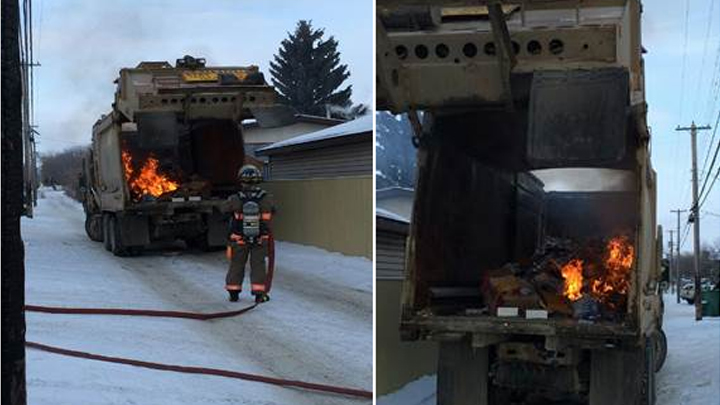SASKATOON – Be careful what you are throwing into garbage bins. That’s the warning from Saskatoon Fire Department after a recent fire.

On Tuesday, firefighters had to put out a fire inside a garbage truck. There was no damage to the truck as the amount of garbage in the truck’s cargo hold was quite low.
However, officials say the fire underscores the need for people to be careful about what they are tossing into garbage bins in order to reduce the risk of fire, explosions and environmental damage.
READ MORE: Saskatoon firefighters extinguish blaze inside apartment
Flammable or explosive items along with unknown liquids and hazardous household substances should never be discarded in a black bin. The concern with liquids and household substances is that they might become explosive when mixed with other substances that could be in a garbage truck.
Smoking material should be completely put out before being placed in a black bin. A good rule of thumb, say officials, is to run smoking material under water before placing in a garbage bin. The same rule applies for ashes or waste from fire pits and fireplaces.
Renovation waste is prohibited in garbage bins.
If you do have hazardous waste that needs to be disposed, those can be dropped off during the city’s household hazard waste days. Materials accepted include:
- Acid – battery acid, toilet bowl cleaner, sulphuric acid, hydrochloric acid
- Adhesives – contact cement, resin, glue, sealer, caulking
- Aerosols – hair spray, insect repellant, lubricant spray, furniture cleaner
- Automotive – used oil, oil filters, antifreeze
- Batteries – alkali, dry cell, NiCad, lithium, lead-acid (automotive)
- Cleaners – floor, carpet, clothing, oven, glass, car wax, disinfectant
- Cylinders – propane, helium, oxygen, acetylene, fire extinguishers
- Corrosives – drain cleaner, engine degreaser, ammonia, sulfuric acid
- Fuels – gasoline, diesel, kerosene, oil/gas mixture
- Light bulbs & ballasts
- Oxidizing chemicals – chlorine, bleach, pool chemicals, fertilizer, hydrogen peroxide
- Pesticides and fertilizers
- Pharmaceuticals – but no needles, sharps or biological waste
- Propane cylinders – barbeque cylinders (20 lb), camp cylinders (1 lb)
The first household hazardous waste day of 2016 takes place on April 23 at a temporary site at the SaskTel Centre parking lot.


Comments